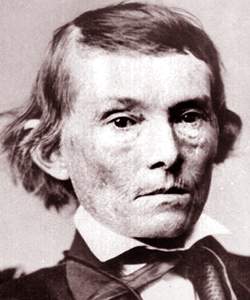Alexander Hamilton Stephens (American National Biography)
Scholarship
In the 1860 election extremists, like [Alexander Stephens'] friend Robert Toombs, worked hard to break up the Democratic party, but Stephens only entered the campaign after he had been selected, without his approval, as a Douglas elector. In the wake of Lincoln's election, he did hasten to reassure Georgians that the new president was no threat. Along with several other leading politicians, he addressed the legislature on the situation. In his 14 November 1860 speech, he said that the Union protected slavery, that no unconstitutional or hostile act had been taken to justify secession, and that a state convention should be called, along with a regional conference of all the southern states. This brilliant speech, temporarily slowing the movement to secession, provoked a famous exchange with President-elect Lincoln, in one letter of which Lincoln made the often-quoted comment: "You think slavery is right, and ought to be extended; while we think it is wrong, and ought to be restricted."
Privately, however, Stephens seems to have been convinced that secession was unavoidable after Lincoln's election. Indeed, he and the state's antisecessionist leaders did little to influence the election of a secession convention or its members once it was called. Had they done so, the outcome might conceivably have been different, since the resolution to oppose immediate secession failed in the convention by only thirty-six votes, 166-130.
Privately, however, Stephens seems to have been convinced that secession was unavoidable after Lincoln's election. Indeed, he and the state's antisecessionist leaders did little to influence the election of a secession convention or its members once it was called. Had they done so, the outcome might conceivably have been different, since the resolution to oppose immediate secession failed in the convention by only thirty-six votes, 166-130.
Michael Perman, "Stephens, Alexander Hamilton," American National Biography Online, February 2000, http://www.anb.org/articles/04/04-00948.html.
Alexander Hamilton Stephens (Congressional Biographical Directory)
Reference
STEPHENS, Alexander Hamilton, (great-great-uncle of Robert Grier Stephens, Jr.), a Representative from Georgia; born near Crawfordville, Taliaferro County, Ga., on February 11, 1812; attended private and public schools; was graduated from the University of Georgia at Athens in 1832; taught school eighteen months; studied law; was admitted to the bar in Crawfordville in 1834; member of the State house of representatives 1836-1841; served in the State senate in 1842; elected as a Whig to the Twenty-eighth Congress to fill the vacancy caused by the resignation of Mark A. Cooper; reelected as a Whig to the Twenty-ninth through Thirty-first Congresses, as a Unionist to the Thirty-second Congress, as a Whig to the Thirty-third Congress and as a Democrat to the Thirty-fourth and Thirty-fifth Congresses and served from October 2, 1843, to March 3, 1859; chairman, Committee on Territories (Thirty-fifth Congress); was not a candidate for renomination in 1858; member of the secession convention of Georgia in 1861, which elected him to the Confederate Congress, and was chosen by that Congress as Vice President of the provisional government; elected Vice President of the Confederacy; one of the commissioners representing the Confederacy at the Hampton Roads conference in February 1865; after the Civil War was imprisoned in Fort Warren, Boston Harbor, for five months, until October 1865; elected to the United States Senate in 1866 by the first legislature convened under the new State constitution, but did not present his credentials, as the State had not been readmitted to representation; elected as a Democrat to the Forty-third Congress to fill the vacancy caused by the death of Ambrose R. Wright; reelected to the Forty-fourth and to the three succeeding Congresses and served from December 1, 1873, until his resignation November 4, 1882; chairman, Committee on Coinage, Weights, and Measures (Forty-fourth through Forty-sixth Congresses); elected Governor of Georgia in 1882 and served until his death in Atlanta, Ga., March 4, 1883; interment in a vault in Oakland Cemetery; reinterment on his estate, “Liberty Hall,” near Crawfordville, Ga.
“Stephens, Alexander Hamilton,” Biographical Directory of the United States Congress, 1774 to Present, http://bioguide.congress.gov/scripts/biodisplay.pl?index=S000854.



